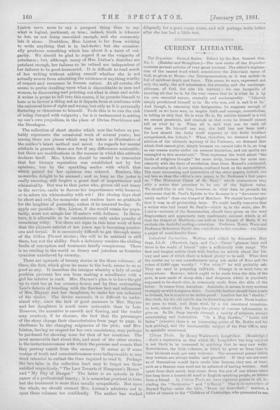CURRENT LITERATURE.
The Expositor. Second Series. Edited by the Rev. Samuel Cox. No. I. (Hodder and Stoughton.)—The new series of the Expositor contains several articles of very great interest. The editor's explana- tion of the sacred word which constitutes the Jehovistic name of God, as given to Moses—the Tetragrammaton, as it was called—is full of spiritual depth and force. This name, he says, expressed not only the unity, the self.subsistence, the eternity, and the unchange- ableness, of God, but also his mystery ; wo are incapable of knowing all that he is, for the very reason that ho is what he is by his own essential nature, eternally and unchangeably. "Jehovah simply proclaimed himself to be He who was, and is, and is to be.' And though, in assuming this designation, ho suggests enough of himself, as we have seen, to inspire faith and courage, nevertheless, in telling us only that He is what He is, He enfolds himself in a veil we cannot penetrate, and reminds us that even he himself cannot tell us what ho is. When all is said that can be said, all that even He himself can say, the half has not been told ; for bow should the finite word express, or the finite intellect comprehend, the Infinite ? When, therefore, we demand a logical solution of the ultimate mystery of the Universe, wo demand that which God cannot give, simply because we cannot take it in, so long as our reason works under its present limitation, and our spirits are entangled in this mortal coil." That expresses the truth about "the limits of religious thought" far more truly, because far more con- sistently with the facts of revelation, than Dean Mousers celebrated, but confusing and, in our opinion, confused book on the same subject. The most interesting and instructive of the other papers, indeed, one not less so than the editor's own paper, is Dr. Matheson's first paper on " The Historical Christ of St. Paul," which commences very ably a series that promises to be one of the highest value. We should like to ask him, however, on what data he grounds his statement that St. Paul's Epistle to the Romans is a "document cer- tainly earlier" than our Gospel of Matthew. We should have thought that it was, in all probability, later. We could hardly conceive that a writer who had heard St. Paul's—which is, in the main, also St. Luke's—account of the Resurrection, should have given us the very fragmentary and apparently very inadequate account which is all that the Gospel of Matthew,—as well as the Gospel of Mark, if we exclude the doubtful ending,—contains. Professor Henry Wace and Professor Robertson Smith also contribute to this number,—the latter a paper of considerable force.






































 Previous page
Previous page